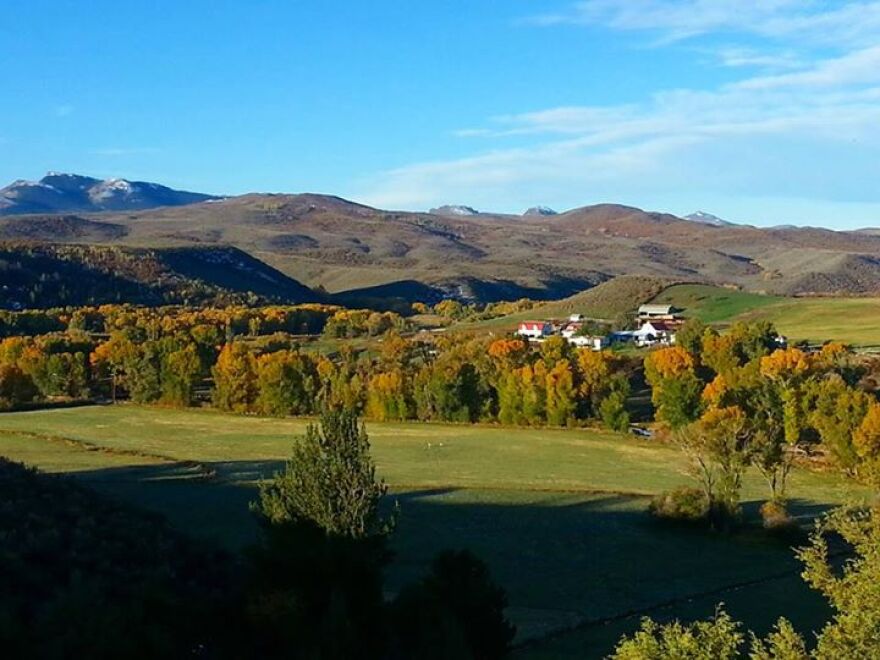For most of Wyoming's history, mineral rights have clearly taken precedence over surface rights. But in 2005, the Legislature passed a split estate law which, for the first time, gave surface owners some say over how their land could be used to access the minerals below it. It was a big change, but many have argued since that it didn’t go far enough.
As Wyoming Public Radio’s Stephanie Joyce reports, a case heard by the Oil and Gas Conservation Commission this week tested the limits of the law, and the rights of surface owners.
STEPHANIE JOYCE: The hearing was about an issue called seismic bonding. The name may be boring, but for Patrick and Sharon O’Toole, the issue is anything but. They own the Ladder Livestock Ranch in the Little Snake River Valley in southern Wyoming, and seismic bonding has caused massive upheaval in their lives over the last year.
PATRICK O'TOOLE: The rules give them the opportunity to run over landowners, and they did.
JOYCE: The ‘they’ is oil and gas company GRMR. GRMR owns the oil and gas estate below the O’Toole’s surface property. The company approached the O’Tooles earlier this year asking for access to their property to conduct seismic testing, a process used to map the locations of oil-rich fractures. Sharon O’Toole says GRMR offered them the same deal it offered their neighbors.
SHARON O'TOOLE: You know, "Sign here. We don't pay any what’s called a trespass fee commonly, but [essentially] a surface use fee’"-- which is absolutely the norm in the industry -- "and we'll pay for damages, but we get to decide what are damages."
JOYCE: Unimpressed by the offer, the O’Tooles refused. The exact details of the subsequent back and forth are in dispute, but the end result was that GRMR eventually went to the Oil and Gas Commission and asked for permission to access the land without the O’Tooles’ consent, through a process called “bonding on.” Effectively, GRMR asked to post a $13,000 bond to cover any potential damages, in exchange for the Commission overriding the O’Tooles’ objections. Patrick O’Toole says it came as a shock that the company could do that.
PATRICK O'TOOLE: You know, you tell somebody what happened... and they go "That would never happen to me. I wouldn’t let anybody on my land." Or "They’re not going to do that to me." Well, they will.
JOYCE: The Commission approved GRMR’s request, and gave its blessing for the company to move forward with seismic testing. In this case, that involves setting off buried dynamite charges, and then recording the energy waves that are produced. GRMR says it’s incredibly low-impact, especially relative to other forms of seismic testing. The O’Tooles disagree. They say the helicopters that the company uses to move equipment have scared away game in the area and that the blasts could ruin their water wells. To them, the $13,000 bond didn’t take into account those disruptions, and so, for the first time in Wyoming history, they challenged the bond amount set by the Commission.
BRIDGET HILL: Docket number 715-2013. The Ladder Livestock Company et al and the objection to the seismic bond.
JOYCE: The hearing process closely resembles a trial, with each side having the opportunity to call witnesses and introduce evidence into the record. Typically, both parties would be represented by an attorney. GRMR hired Lynne Boomgaarden, a former oil and gas commissioner. But the O’Tooles opted to represent themselves.
Because of the Commission’s rules, that meant they weren’t allowed to cross-examine GRMR’s witnesses or challenge its evidence. So, after several hours of testimony from GRMR employees, a round of posters and the video deposition of a land expert, the O’Tooles still hadn’t spoken.
Instead, commissioners asked the company questions.
State geologist Tom Drean:
TOM DREAN: I would like to hear why this is lower impact than other programs.
Governor Matt Mead:
MATT MEAD: And you don’t believe your activities reduce the hunting opportunities?
JOYCE: Ultimately satisfied with the answers they received to those questions and others, the commissioners voted unanimously to uphold the bond, saying the law only allows them to take into account concrete damages, and that the O’Tooles’ concerns about hunting and well damage were vague and unsubstantiated.
So where does that leave the O’Tooles? Patrick says it raises a fundamental question for him about what the state values.
PATRICK O'TOOLE: Why did their activities take precedence, not just over us, but over every public land hunter in southern Wyoming? That’s what happened.
JOYCE: He’s planning to lobby the legislature for changes to the split estate law. But in the meantime, the fight over bonding may not be over. If GRMR finds exploitable deposits underneath the O’Tooles’ property, the two will once again have to try and negotiate a surface use agreement. And in light of the outcome of the seismic bond proceeding, Sharon O’Toole says it’s not clear they’ll have much leverage.
SHARON O'TOOLE: I don't know what sort of due process we have available to us.
JOYCE: For now, the answer might just be: none.
Correction: Lynne Boomgaarden's name was spelled incorrectly in the original version of this story.









